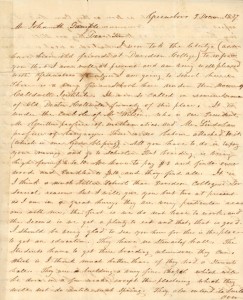This week is North Carolina Archives Week, and since this year’s theme is “Home Grown: A Celebration of N.C. Food Culture and History,” what better time to delve into the history of farming at Davidson?
Davidson College was founded as a manual labor school, which meant that the earliest students “perfom[ed] manual Labor either agricultural or mechanical in the manner and to the extent determined by the Board of Trustees,” as mandated by March 1839 Constitution of Davidson College. Manual labor was seen as a way of reducing the cost of education and thereby making college affordable to more than the sons of the upper classes, and as a benefit to both the physical and mental heath of students. President Robert Hall Morrison spelled out the societal benefits that manual labor education could bring about in his August 2, 1838 close of term address, stating that:
The efforts of all enlightened men should be combined to improve the moral condition of society by rendering manual labor more reputable and inviting. This is not to be done solely by pronouncing eulogies, but, as time and circumstances will permit, by holding the spade, the axe, the plow, and the plane. Educated men should prove that they are not above doing as well as praising the labor by which society lives.
But while President Morrison waxed poetic on the possibilities of labor, the students had very different feelings. Alexander Bogle (class of 1843), wrote to a friend that “now comes the work which is not so pleasant… We have to work very hard three hours which is the time allotted and you know that it is pretty hard to work that long.”

Similarly, Pinckney B. Chambers (class of 1840) recalled for the Charlotte Daily Observer in 1903 that “The farm work was greatly hampered by the tendency of the mischievous and shiftless to misplace the tools and outwit the overseer.” He was more colorful in his distaste for manual labor in a letter to John M. Sample in 1837, after he had transferred to Caldwell Institute:
There is no labor attached to it. (which is one of God’s blessings) All you have to do is to pay your money and go to school… It is I think a much better school than Davidson College. For several reasons but I will give you but two at present as I am in a great hurry, they are very particular reasons with me, the first is we do not have to work, and the second is we get plenty to eat and that, that is good.

By 1841, it was clear that the manual labor system wasn’t achieving its aims – rather than lowering costs and making education more accessible, Davidson was losing money on the endeavor. The Board of Trustees voted to abolish the system, and the college farm experiment came to a close.
More than 170 years later, Davidson students are back on the farm – this time on a voluntary basis, rather than a mandatory one. The Farm at Davidson, purchased in 2008, became a working farm again last fall. The College farm provides sustainable produce for Vail Commons, Davis Cafe, and Much Ado Catering, as well as a space for students and members of the Davidson community to learn about where their food comes from.
As Farm Manager Theresa Allen explains, there’s a great deal of student interest in the farm: some students help work the farm, some conduct soil experiments, and some even take naps – a far cry from the manual labor farm days! The farm’s office hours/ work days for this semester are Fridays from 1 to 4 PM, so head over to 1603 Grey Road to check out the veggies you’ll be eating later!